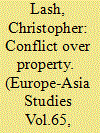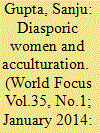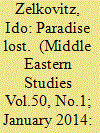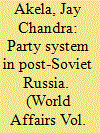| Srl | Item |
| 1 |
ID:
129465


|
|
|
|
|
| Publication |
2013.
|
| Summary/Abstract |
This article examines housing conflicts during times of displacement in World War II and its aftermath. It looks specifically at the property experiences of eastern Poles in the western Polish town of Zielona Góra after forced displacement from the Soviet Union. It explores the intricate relationship between property and population displacement. By examining a micro-historical process at a time when property relations were in flux, we can investigate how displaced people negotiated spaces for themselves within a complicated set of realities. The article also adds to work done on state-society relationships in immediate post-World War II Poland.
|
|
|
|
|
|
|
|
|
|
|
|
|
|
|
|
| 2 |
ID:
128182


|
|
|
|
|
| Publication |
2014.
|
| Summary/Abstract |
Diasporas are the human face of the globalization process. The contemporary importance of Diasporas can be related to the seemingly contradictory historical processes of consolidation of national cultural identities and large international migrations. Though the phenomenon of migration is as old as the existence of humanity, international migration on a large scale started during colonial times. Labour demand, political conflicts, technological changes and trade and commerce together, contribute to international migration becoming one the most important determinant of modern global change.
This paper attempts to explain the cross cultural conflicts, trauma, isolation, aspirations and dilemmas of the Indian Women immigrants in Jhumpa Lahiri's The Namesake , especially Aashima Ganguly, who find herself in between the native culture and host culture and her trishanku experience of being neither in Calcutta nor in America which is at the very centre of diasporic trauma. Ashima is a true representative of the majority of women expatriates who are reluctant to change or adapt to the culture of the host country. But still she sacrifices all her comforts for the sake of her family and like the typical traditional Indian women; her life revolves around her husband and children.
|
|
|
|
|
|
|
|
|
|
|
|
|
|
|
|
| 3 |
ID:
128212


|
|
|
|
|
| Publication |
2014.
|
| Summary/Abstract |
The article discusses the evolution of the Palestinian community in Kuwait in the wake of the 1948 War. The demand for skilled labour facilitated the gradual integration of the Palestinians into Kuwaiti society, especially in the education system and state institutions. In this regard the article examines the role of education and students in creating personal and political socio-economic networks. The relatively liberal political atmosphere in Kuwait during its years of development transformed it into a hotbed for Palestinian political activism. This trend continued up to the 1991 Gulf War, when Yasir Arafat's support of Saddam Husayn in that wa, caused the fall from grace of the Palestinians in Kuwait. This ended the central role that the Palestinians played in the historical process of Kuwait state building. Following the death of Arafat the PLO began to seek reconciliation with Kuwait. At this timely moment in the history of relations between these two communities, the article sheds light on these efforts.
|
|
|
|
|
|
|
|
|
|
|
|
|
|
|
|
| 4 |
ID:
154254


|
|
|
|
|
| Summary/Abstract |
This article describes the principles and features of the party based political system in Russia and analyses the historical process that transformed the country from a single party polity within the Soviet Union into a multiparty democracy. It shows that the last decade of the twentieth century—marked by a proliferation of parties, a fragmentation of society, social decline and political paralysis—was succeeded from 2001 by the ongoing period of the concentration of power in the hegemonic party United Russia led by Vladimir Putin. This socially conservative but economically liberal and reformist party aims to build a middle class capable of supporting a stable democracy.
|
|
|
|
|
|
|
|
|
|
|
|
|
|
|
|